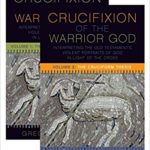We run our website the way we wished the whole internet worked: we provide high quality original content with no ads. We are funded solely by your direct support. Please consider supporting this project.

The Starting Point for “Knowing God”
While it makes sense that Hellenistic philosophers embraced knowledge of God as the simple, necessary and immutable One in an attempt to explain the ever-changing, composite, contingent world (see post here for what this means), it is misguided for Christian theology to do so. By defining knowledge of God’s essence over-and-against creation, we are defining God’s essence over-and-against Christ, the very one who is supposed to be the definitive revelation of God’s essence. The concern with preserving the absolute distinction between God and creation is certainly necessary, but this is not the way to do it. For preserving this distinction is without value unless we are remaining faithful to the revelation of God in Christ by placing our complete trust in it and by demonstrating our trustworthiness in living in accordance with it.
Hence, rather than starting with a concept of God that moves away from becoming, contingency, dependency and suffering, I submit that our knowledge of God must start with the fact that God became a human and suffered at the hands of wicked humans and fallen angels as he suffered a God-forsaken death for us on the cross. From this cross-centered perspective, any who construe God’s transcendent essence as excluding contingency, becoming, dependency and suffering can only be understood as trying to protect God’s transcendent essence from his own self-revelation—as if they know God’s transcendent essence better than God himself!
To affirm Christ as the Incarnation of God is to consider the experiences of the man Jesus to also be experiences of the divine Jesus. This means that the suffering of the man Jesus on the cross must be accepted as the suffering of God on the cross. Indeed God’s self-sacrificial suffering unambiguously reveals his eternal essence. To insert a wedge between the divinity and humanity of Christ undermines the revelation of God in the crucified Christ and uncovers an allegiance to a concept of divine transcendence that is derived from a source outside the crucified Christ.
The only way to remain faithful to the revelation of God in the crucified Christ as we reflect on God’s “wholly other” transcendence is to refuse to speculate about a hypothetical transcendence over-and-against this revelation. Instead we must seek to discern God’s transcendence in the “wholly other” quality of the revelation of the crucified Christ.
As I interpret him, this is close to what Luther was getting at with his first conception of God’s hiddenness. He was noting that the utter incomprehensibility of God is most clearly unveiled precisely when God is most unambiguously revealed. God’s unfathomable distance from us is most profoundly revealed precisely when God stoops an infinite distance to come most close to us, diving not only into our humanity, but also into our sin and our curse.
Hence, the definitive disclosure of God’s “wholly other” transcendence takes place precisely in God’s definitive accommodation of our limitations and sin on Calvary. With his concept of God’s hiddenness in the midst of his revelation, I suspect Luther was, in his own way, astutely observing that the Incarnate and Crucified Christ should at one and the same time serve as the ultimate source of our conception of divine accommodation as well as our conception of divine transcendence.
Image by Joshua Earle via Flickr.
Category: General
Tags: Cruciform Theology, God, Jesus, Luther, Transcendence
Related Reading

Does the Old Testament Justify “Just War”?
Since the time of Augustine, Christians have consistently appealed to the violent strand of the Old Testament to justify waging wars when they believed their cause was “just.” (This is Augustine’s famous “just war” theory.) Two things may be said about this. First, the appeal to the OT to justify Christians fighting in “just” wars…

Did God Assist the Israelites in the Violent Battle with the Amalekites? (podcast)
Greg keeps his hands in the air as he battles against Old Testament interpretations that portray God as violent. http://traffic.libsyn.com/askgregboyd/Episode_0748.mp3

The Cross in the Manger, Part 2
While some shepherds were tending their flock, an angel appeared to them announcing “good news that will cause great joy for all the people,” for it news about “a Savior…the Messiah, the Lord” (Lk 2:10-11). Most Jews of this time expected a Messiah who would save them by vanquishing their Roman oppressors and liberating Israel…

God’s Moral Immutability
Classical theologians from the fourth and fifth centuries on were very concerned with protecting their understanding of the metaphysical attributes of God—like timelessness, immutability, impassibility—by assessing biblical portraits that conflicted with these attributes to be accommodations. However, once we resolve that all our thinking about God must be anchored in the cross, our primary concern…

Our True Eternal Home
In becoming our sin and bearing the death-consequences of sin, Christ has opened the way for us to participate in the fellowship of the triune God. Because of the cross, we are now free to abide in Christ and to have Christ abide in us (John 15:4-10). The word “abide”(menno) means “to take up residence.”…

Reviewing the Reviews: Tom Belt (Part 1)
Tom Belt has written a four-part review of Crucifixion of the Warrior God on his blog An Open Orthodoxy. Parts 1 and 2 offer an overall fair and balanced summary of CWG, at least to the point that correcting misunderstandings would feel petty. In Part 3 Tom offers a critique of volume I, and this is what I’d like…
